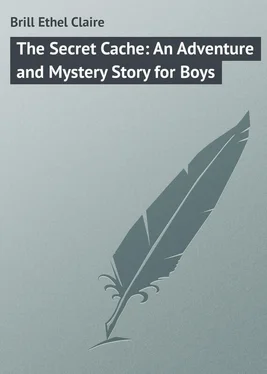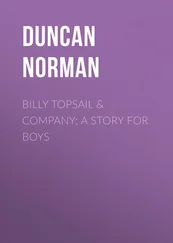Ethel Brill - The Secret Cache - An Adventure and Mystery Story for Boys
Здесь есть возможность читать онлайн «Ethel Brill - The Secret Cache - An Adventure and Mystery Story for Boys» — ознакомительный отрывок электронной книги совершенно бесплатно, а после прочтения отрывка купить полную версию. В некоторых случаях можно слушать аудио, скачать через торрент в формате fb2 и присутствует краткое содержание. ISBN: , Жанр: Прочие приключения, foreign_prose, на английском языке. Описание произведения, (предисловие) а так же отзывы посетителей доступны на портале библиотеки ЛибКат.
- Название:The Secret Cache: An Adventure and Mystery Story for Boys
- Автор:
- Жанр:
- Год:неизвестен
- ISBN:http://www.gutenberg.org/ebooks/43293
- Рейтинг книги:3 / 5. Голосов: 1
-
Избранное:Добавить в избранное
- Отзывы:
-
Ваша оценка:
- 60
- 1
- 2
- 3
- 4
- 5
The Secret Cache: An Adventure and Mystery Story for Boys: краткое содержание, описание и аннотация
Предлагаем к чтению аннотацию, описание, краткое содержание или предисловие (зависит от того, что написал сам автор книги «The Secret Cache: An Adventure and Mystery Story for Boys»). Если вы не нашли необходимую информацию о книге — напишите в комментариях, мы постараемся отыскать её.
The Secret Cache: An Adventure and Mystery Story for Boys — читать онлайн ознакомительный отрывок
Ниже представлен текст книги, разбитый по страницам. Система сохранения места последней прочитанной страницы, позволяет с удобством читать онлайн бесплатно книгу «The Secret Cache: An Adventure and Mystery Story for Boys», без необходимости каждый раз заново искать на чём Вы остановились. Поставьте закладку, и сможете в любой момент перейти на страницу, на которой закончили чтение.
Интервал:
Закладка:
Anxious to avoid questions, Hugh had not accompanied Blaise. He occupied himself with fishing from the canoe, and caught one lake trout of about three pounds weight. Making a grill of willow twigs resting on stones over the coals, he had the trout ready to broil when Blaise returned. The common way of cooking fish among both the Indians and white men of the woods was to boil them, but Hugh, recently from the civilized world, preferred his broiled, baked or fried.
Blaise, after one mouthful, deigned to approve his elder brother’s cooking. “It is good,” he said. “I have not eaten fish so cooked since I ate it on Fridays in school at Quebec.”
Neither lad had anything more to say during the meal or for some time afterwards. Finally Blaise put his hand in the leather pouch he wore at his belt, drew out something and handed it to Hugh. The latter unwrapped the bit of soft doeskin and found his father’s gold seal ring. He glanced quickly up at Blaise.
“It is yours,” the younger brother said. “I gave it not to you before, because I liked not to part with it.”
Moved by a generous impulse, Hugh stretched out his hand to return the ring, but Blaise would not take it.
“No,” he said firmly. “You are the elder son. It is yours.”
The adventurers intended to continue their trip next day, but fate was against them. Before dawn rain was beating on the canoe that sheltered them, and the thundering of the waves on the rocks in the more exposed part of the bay sounded in Hugh’s ears as he woke. That storm was the beginning of a period of bad weather, rain, fog, and wind that cleared the air, but rose to a gale, lashing the waters of the bay to white-capped waves that did not diminish until hours after the wind had blown itself out. Eight days the two camped in a hastily built wigwam on Wauswaugoning Bay, fishing when they could, and snaring one lean hare and a few squirrels. They hunted for larger game and found some deer tracks, but did not catch sight of the animals. As for birds, they saw none but gulls, a loon or two and an owl, and did not care to try anything so tough and strong for food. So they were obliged to consume a good part of their corn.
VIII
THE BLOOD-STAINED TUNIC
But a few days of May remained when Hugh and Blaise left Wauswaugoning. Their progress was necessarily slow, not only on account of delays due to wind and weather, but because they were obliged to skirt the shore closely, entering each bay and cove, rounding every point, and keeping keen watch for any sign of the wrecked boat. They had no clue to the spot where it lay. It might have been thrown up on the open shore, or driven into some rock-infested bay or stream mouth. At each stream they made a close examination, ascending a short distance, by canoe where that was possible, or up over the rocky banks on foot. They had searched the mouths of more than a dozen streams and creeks when they came to one, where Blaise, in entering, cautioned Hugh to steer far to one side. Almost across the river mouth extended a long bar of sand and gravel, covered by an inch or two of water, for the river was still high from the spring flood. Bars or rock reefs were, Hugh was learning, common characteristics of the streams emptying into Superior. To enter them without accident required care and caution.
The bar was passed, but further progress up-stream proved impossible. The current was strong, and just ahead were foaming rapids where the water descended among rocks and over boulders. Steering into a bit of quiet backwater behind the bar, the boys found a landing place and carried the canoe ashore. Then they scrambled up the bank a short distance, searching the stream mouth for signs of the wreck. Caught in a blossoming serviceberry bush growing on a rock at the very edge of the river, Blaise found an old moccasin. He examined the ragged, dirty, skin shoe in silence for a moment. Then, hazel eyes gleaming, he held the thing out to Hugh.
“It is my mother’s work,” he said in tense tones. Hugh snatched the worn moccasin. “Do you mean this was my father’s?”
Blaise nodded. “It is my mother’s work,” he repeated. “I would know it anywhere, the pattern of quills, the shaping, even the skin. It is from the elk hide our father brought from the region of the great river.” He made a gesture towards the southwest, and Hugh knew he referred to the Mississippi. “See, it is just like ours,” Blaise concluded, holding up one foot.
Hugh glanced from the almost new moccasin to the ragged one, and drew a long breath. “Then it may be about here somewhere father was wrecked.”
“We must make search,” was the brief reply.
Thoroughly they searched, first the banks of the stream, then the lake beach, parallel ridges of flat flakes of rock pushed up by the waves. They even examined the ground beyond the beach, a rough slope composed of the same sort of dark rock flakes, partly decomposed into crumbly soil. The two pushed through the bushes and small trees that sparsely clothed the stony ground, but nowhere did they find any sign of wrecked boat or hidden cache. Yet they did find something, something that hinted of violence and crime.
Well up from the shore and not far from the stream bank, Hugh came upon an open space, where a ring of blackened stones and ashes showed that a cooking fire had burned. He took one look, turned and plunged into the bushes to find Blaise. But he stopped suddenly. His foot had come in contact with something that was not a rock, a stump or a stick. Stooping, he pulled from under a scraggly wild raspberry, where it had been dropped or thrust, a bundle. Unrolling it, he found it to be a ragged deerskin tunic, damp, dirty and bearing dark stains. The boy stood transfixed staring at the thing in his hands. After a moment he raised his head and shouted for Blaise.
Blaise answered from near by, but to Hugh it seemed a long time before the younger boy came through the bushes. In silence the elder handed the other the stained shirt. Blaise took it, examined it quickly and uttered an Indian grunt.
“Blood?” asked Hugh pointing to the stains.
Blaise grunted assent.
“Father’s blood?” Hugh’s voice broke.
Blaise looked up quickly. “No, no. Black Thunder’s.”
“How do you know?”
“By this.” The lad pointed to a crude figure, partly painted, partly embroidered in black wool, on the breast of the tunic. “This is Black Thunder’s mark, the thunder bird. Without doubt this shirt was his.”
“But how did it come here? There’s no sign of the wrecked boat.”
Blaise shook his head in puzzlement. “I do not understand,” he said slowly.
The half-breed lad was keen witted in many ways, but the white boy’s mind worked more quickly on such a problem. “It may be,” Hugh speculated, “that they were wrecked farther along the shore. Coming on by land, they camped here and some accident happened to Black Thunder, or perhaps he had been bleeding from a hurt received in the wreck, and he changed his shirt and threw away the bloody one.”
“Where was it?” asked Blaise.
“Under this raspberry bush, rolled up.”
“And why think you they camped here?”
“I’ll show you.”
Hugh led the way to the little clearing. Carefully and absorbedly Blaise examined the spot.
“Someone has camped here,” he concluded, “but only a short time, not more than one night. He made no lodge, for there are no poles. He cut no boughs for beds, and he left scarce any litter. It may be he cooked but one meal and went on. If he lay here for the night, the marks of his body no longer remain. If anyone was slain here,” he added after a moment, “the rains washed out the stains. It was a long time ago that he was here, I think.”
“If Black Thunder was killed here,” Hugh questioned, “what was done with his body?”
Читать дальшеИнтервал:
Закладка:
Похожие книги на «The Secret Cache: An Adventure and Mystery Story for Boys»
Представляем Вашему вниманию похожие книги на «The Secret Cache: An Adventure and Mystery Story for Boys» списком для выбора. Мы отобрали схожую по названию и смыслу литературу в надежде предоставить читателям больше вариантов отыскать новые, интересные, ещё непрочитанные произведения.
Обсуждение, отзывы о книге «The Secret Cache: An Adventure and Mystery Story for Boys» и просто собственные мнения читателей. Оставьте ваши комментарии, напишите, что Вы думаете о произведении, его смысле или главных героях. Укажите что конкретно понравилось, а что нет, и почему Вы так считаете.












